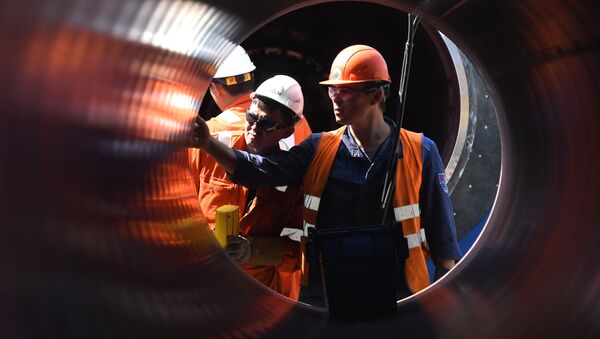Klaus Ernst, the head of the German parliament’s economy and energy committee, has called for Berlin to consider countermeasures if the US slaps sanctions against the Nord Stream 2 gas pipeline project.
Touching upon the Bundestag’s move last month to pass a bill regulating the Nord Stream 2-related application of amendments to the EU Gas Directive, Ernst pointed out that he would prefer that this could not be used against the project.
“However, a compromise was reached at the EU level […] and the Bundestag included it in national legislation. This means that Germany has been authorised to regulate ‘unbundling’ pertaining to 12 nautical miles of the Nord Stream 2 pipeline. The [German] Federal Network Agency is currently dealing with this work,” he said.
After the European Commission amended its Gas Directive in April, the document entered into force on 23 May. It stipulates that a third-party nation cannot own both the pipeline and gas imported into the EU market unless the conduit was built before 23 May 2019, also known as so-called unbundling.
German MP Reveals How Nord Stream 2 Can Be Removed From European Regulation
When asked whether Nord Stream 2 can be fully or partially withdrawn from European regulation, including the unbundling rule, Ernst said that there are “two options which are possible and feasible”.
“[First,] the Federal Network Agency may decide that everything remains as it is. This means that the Nord Stream 2 AG company will continue to operate the pipeline, an option which is the most feasible one, given that it was the commercial basis for the construction of the pipeline. Changing conditions during its construction is an additional burden for the consortium. Therefore, it is safe to assume that the Federal Network Agency could interpret the application of European law in this way. If not, there is another option stipulating that the last few kilometres will be transferred to other operators,” he added.
US Sanctions Against Nord Stream 2 ‘Run Counter to International Law’
According to Ernst, possible US sanctions against Nord Stream 2 will not play a role in the regulation because “the Federal Network Agency does not do business with the US and should not take into account the sanctions that Washington is threatening to introduce”.
He said that “the federal government sees these sanctions as extraterritorial and something that runs counter to international law”.
“Americans should not care about how we develop our energy policy. In this regard, these sanctions are absolutely unacceptable. The federal government must defend itself against this. If the sanctions hamper the operation of the pipeline, one should think about countermeasures, including increasing duties on imported American [shale] gas produced with the help of fracking,” Ernst noted.
‘Germany Wants Russian Gas’
Referring to some Eastern European countries that oppose the Nord Stream 2 project, he urged them to turn to the EU so that they can get financial support through relevant funds.
“This support will be paid for from the EU budget, not by German gas consumers. Otherwise, this would lead to higher gas prices in Germany and Europe,” Ernst said.
He added that “the issue of price matters when it comes to what kind of gas is in demand in Germany”.
“As long as Russian gas is much cheaper and more environmentally friendly than American shale gas produced by the fracking method, this fuel will be purchased by Germany,” Ernst pointed out.
Dwelling on the subject of alleged dependence on Russian gas, he stressed that “Russians are dependent here at least to the same extent because they want to sell the fuel to us.”
“Currently, there is a wide consensus, including in the German Bundestag, that we want Russian gas and want to maintain relations with Russia. Also, more lawmakers start to support the end of anti-Russian sanctions,” he concluded.
US Closer to Slapping Sanctions on Nord Stream 2
Ernst’s remarks come after US Under Secretary of State David Hale told a Senate panel on Tuesday that Washington might resort to sanctions to stop Russia’s Nord Stream 2 pipeline if its diplomatic campaign to persuade European leaders failed.
In September, the US Senate the Foreign Relations Committee passed the bill, envisioning economic action against entities and individuals involved in building the pipeline, which the committee claims threatens Europe's energy security.
Due to be finished before the end of this year, Nord Stream 2 is a joint venture between the Russian energy giant Gazprom and five European companies: France's ENGIE, Austria's OMV, the UK-Dutch Royal Dutch Shell, and Germany's Uniper and Wintershall.
The 745-mile (1,148-km)-long twin pipeline will carry up to 55 billion cubic meters (1.942 trillion cubic feet) of gas per year from Russia to Germany.




